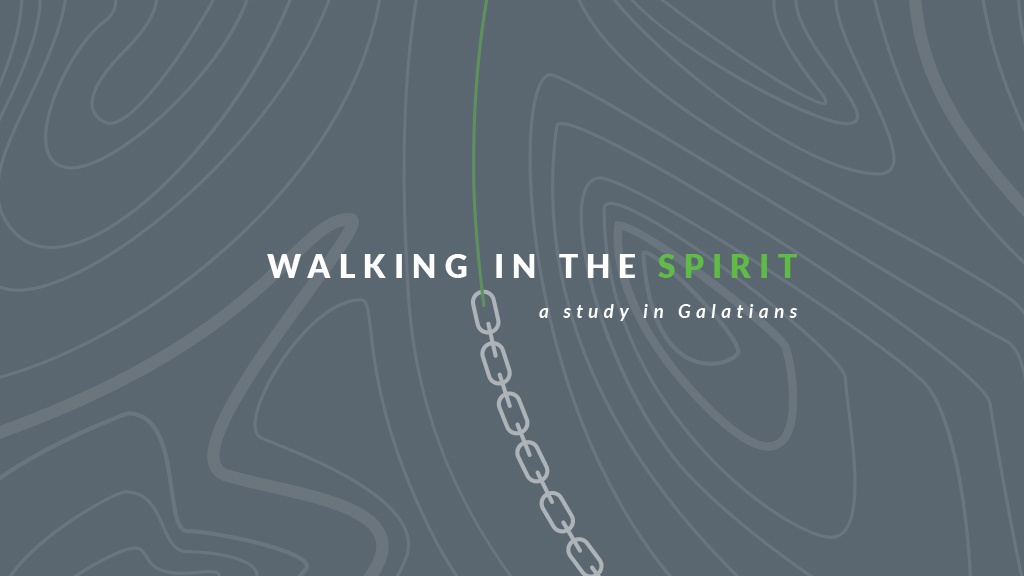Someone has compared living the Christian life to driving down a road in Louisiana. If you’ve ever traveled through much of the state, you know one thing for certain: you don’t ever want to swerve off the road. Why? Well, if you’re in Iowa and you run off the road, you’re just going to run over corn stalks. However, if you run off the road in Louisiana—no matter where—you’re going to end up in a swamp!
In going down the road of the Christian life, you never want to swerve too far to one side of the other because dangerous extremes lie in either direction. So how can we keep away from these extremes that will certainly ruin us? The Apostle Paul states in Galatians 5 that it’s by walking in the Spirit.
The truth is that many people—even professing believers—are living life some other way. Maybe it’s out of ignorance or simply because they were taught a different way of doing things. But we must understand that God has set it up so that walking in the Spirit is the only way to live the Christian life, and nothing else works!
Background of Galatians
Before delving into this study, some insight regarding the history, setting and content of the letter to the Galatians would be helpful. So first, take some time to read the entire book of Galatians. (It’s okay. It’s only six short chapters.) You might also want to read Acts 13–15 to gather some information regarding the circumstances surrounding the writing.
The events of Acts 13–15 provide historical context for Paul’s letter to the Galatians. Notice that Acts 13:1–2 speaks of Paul and Barnabas being set apart and sent out for missionary work from the church in Antioch.
As you read Acts 13–14, note the cities they visited in this first missionary endeavor.
If you look at world geography today, the cities mentioned in Acts 13–14 would be a province in the central part of modern-day Turkey. In these cities, the Gospel was preached, miracles were performed, converts were made, and churches were planted. These are the “churches of Galatia.” (See Ga. 1:2.)
By the time of Acts 15, Paul had left Galatia and made his way to Jerusalem for a meeting called the Jerusalem Council.
Because the issues dealt with in Galatians were also the issues dealt with at the Jerusalem Council, Paul probably wrote Galatians during the time between Acts 14 and 15. It was after his trip to Galatia, and very likely on his way to the Jerusalem Council, that Paul writes to address the false teaching that was disrupting the churches of Galatia. In this letter, he confronts the two extremes that were plaguing the church—both stemming from a faulty understanding of the Gospel.
Confronting the Extremes
Paul doesn’t waste a whole lot of time getting to his point in this letter. After a brief greeting and an account of the person and work of Christ, he states his concern.
Galatians 1:6–8
I marvel that ye are so soon removed from Him that called you into the grace of Christ unto another gospel: Which is not another; but there be some that trouble you, and would pervert the gospel of Christ. But though we, or an angel from heaven, preach any other gospel unto you than that which we have preached unto you, let him be accursed.
WORD STUDY
Marvel—to be continuously amazed
So soon removed—so quickly moving away from; rapidly changing places or transferring loyalty from
Another gospel—a different gospel
Not another—it is not really a gospel at all
Pervert—to turn about and twist; to corrupt
Accursed—to be banned; to be doomed to destruction
Several groups of people had come into the churches of Galatia and had begun teaching a message that at first sounded right, but ended up being dreadfully wrong. They taught that Jesus was the Messiah, the Son of God, who died on a cross and resurrected from the dead. They also taught that in order to receive salvation, a person must put his faith in Jesus, the Messiah. Sounds great! Trust and believe in Christ. But the problem? They didn’t stop there. They taught that in order to have a secure standing before God, the believers also had to follow the laws of the Mosaic Covenant.
Legalism
Sadly, these teachers came to Galatia imposing on Gentiles the idea of having to follow the laws of the Mosaic Covenant in order to receive salvation. It was not that they were denying faith in Jesus; they were saying certain things had to be added to faith. Historically, this teaching has been called legalism. Legalism is not a denial of faith in Jesus; it’s just adding to it.
Understand that legalism is not an outright denial of Jesus; rather, it is an addition of certain works to Jesus’ work in order to have a secure standing before God.
The Apostle Paul wrote to the Galatians to deal with this issue of adding to the message of salvation in order to be saved. Why? Well, because he realized that seeking to add to the work of Jesus actually takes away from it.
But legalism wasn’t the only problem plaguing the churches of Galatia.
Galatians 5:13
For, brethren, ye have been called unto liberty; only use not liberty for an occasion to the flesh, but by love serve one another.
WORD STUDY
Brethren—brothers united by a bond of affection
Called—to invite, to summon
Liberty—the condition of being freeborn or not a slave
Occasion—a place from which a movement or attack is made; a base of operation
Flesh—sinful, human nature
By—through; on account of; because of
Love—selfless sacrifice
Serve—to serve as a slave
License
The faulty thinking Paul addresses here has been termed antinomianism (anti: against; nomos: law). It is a kind of thinking that seeks to celebrate freedom in Christ by doing away with any standard of holy living.
What we find addressed in the book of Galatians are two extremes that can actually be found in churches today: legalism and license.
The whole message of Galatians is about discovering the truth of the Gospel that does away with both extremes. It is not simply discovering the facts of the Gospel; it is discovering the results of the Gospel, namely, freedom in Christ (Christian liberty). This is the ultimate purpose of the work of grace in the life of sinners—to bring man into liberty. (See Gal. 5:1, 13.)
When this liberty is properly understood and enjoyed, it produces a joyful transformation into the likeness of Christ. However, if abused, it leads to a life of frustrating defeat.
|
License |
Liberty |
Legalism |
|
Be a slave to your flesh |
Walk in the Spirit |
Be a slave to the law |
As a Christian, you must be cautious of these dangerous extremes. If you go the route of either legalism or license, you’ll end up ruined and defeated. However, if you learn to truly live in the liberty the Gospel provides, you’ll end up where you need to be—right with God, serving others and bearing His fruit for His glory.
How, then, are we to properly live out this liberty? Paul answers that question by instructing believers to walk in the Spirit. For, as we are going to see, walking in the Spirit is actually the way a believer lives out Christian liberty.
Listen to Dr. Pettit’s chapel message introducing the study in Galatians:
Join us for chapel every Monday through Thursday at 11 a.m. EST.








